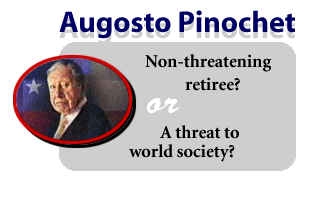|
HOLIDAYS 1998
|
COLUMNISTS
RECENT COLUMN | OTHER COLUMNISTS

ANTHONY MARCIANO, a native of North Providence, Rhode Island, holds a masters degree in political science from Suffolk University. He has worked on various campaigns including current Rhode Island governor Lincoln Almond. Marciano lives in Boston, MA.
CONTACT MARCIANO |

ANTHONY MARCIANO Officials in Great Britain are currently debating the fate of former Chilean President Augosto Pinochet, who has just been released from a London hospital after undergoing back surgery. General Pinochet had visited London several times since stepping down as President in 1990, and was a strong ally of the British during the war over the Falkland Islands. This was the first time that he had traveled to Great Britain since he retired as commander of the Chilean military earlier this year. Nonetheless, he was carrying a diplomatic passport when he made his current trip, since he still serves in the Chilean Parliament as a Senator-for-Life. Despite this fact, the British government is debating whether or not to allow him to return to Chile. The reason for this delay is that a Spanish Judge, Balthazar Garzon, is requesting that Great Britain extradite Pinochet to Spain to face charges that he killed Spanish citizens during his Presidency, which lasted from 1973 to 1990. This is in spite of the fact that Pinochet was pardoned for all offenses that he may have committed while serving as President as part of the 1990 agreement in which he stepped down from the Presidency. The justification that the Spanish courts have given for this unconventional legal maneuver is that the crimes of which they are accusing Pinochet constitute "crimes against humanity", and he is thus subject to trial anywhere in the world. This cannot be allowed to happen. I am confident that saner heads will prevail, and the British will allow Pinochet to spend the remainder of his retirement in Chile, instead of in front of a Spanish court that has no business trying him in the first place. The government of Britain is obligated to honor the fact that the government of Chile granted Pinochet a diplomatic passport, and wishes for him to be returned to Chile as soon as his health permits. The "crimes against humanity" exception that the Spanish are attempting to invoke was incorporated into international law for the purposes of dealing with someone like Hitler or Eichmann, individuals who are so unambiguously evil that we are willing to suspend the normal rules of international law in order that they may face punishment. It was not intended for the settling of political scores by leftists who are still bitter that Pinochet removed the Marxist government of Salvador Allende in 1973, and went on to lead a government that helped make Chile one of the most prosperous and economically sound nations in South America. The fact is, there are many citizens of Chile, and other nations, who are thankful for the decisive action that Pinochet took in installing himself as head of state. There are also those who believe that he should have stood by, and allowed Chile to be turned into a second Cuba. But regardless of whether or not one believes that Pinochet was justified in taking control of the government from Allende, this is a dispute that should be settled by history, and, most importantly, by the people of Chile. It is not a matter to be settled by a court in Spain, or any other foreign nation. Before concluding, allow me to alert you to the dangers that we will face if Judge Garzon's interpretation of international law is allowed to become precedent. The United States government has sponsored military action in nearly every region in the world. In fact, when General Pinochet took power in 1973, we assisted him, believing - correctly, in my view - that a government headed by the pro-Western commander of the Chilean military was preferable to a government headed by avowed Marxists who were believed to have ties to the government of Cuba. Does this mean that the next time that Henry Kissinger leaves the United States, he should be concerned that any nation who can claim that any number of their citizens were killed during the time that Pinochet took power would be able to request his extradition? Or what about George Bush? The military action known as "Operation Desert Storm" resulted in the deaths of many Iraqi civilians. I suppose that the next time he and "Bar" leave the country on a vacation, he ought to be extra careful not to spend the night in any nation that might be sympathetic to a request for extradition from the government of Iraq. Are these scenarios likely to take place anytime soon? Probably not. But we must consider what type of precedent we are setting with the proposition that anyone accused of "crimes against humanity" can be pursued at any time and any place. * * * * PICTURE of Pinochet copyright ©1998 Reuters |
